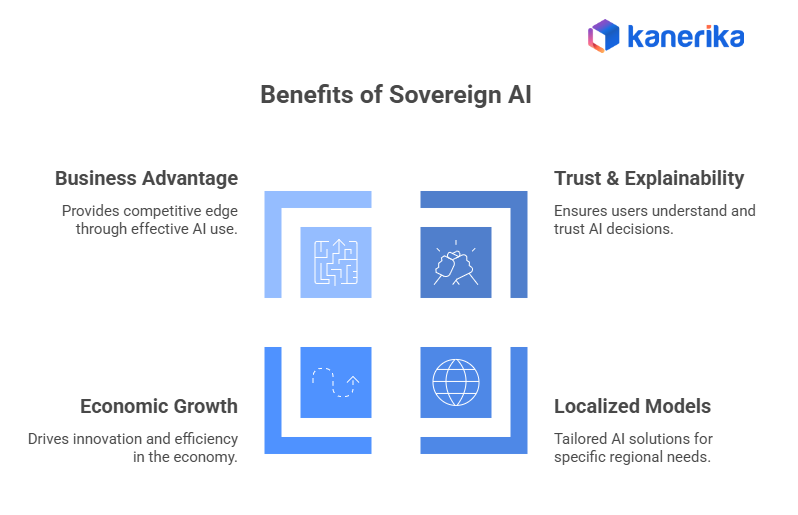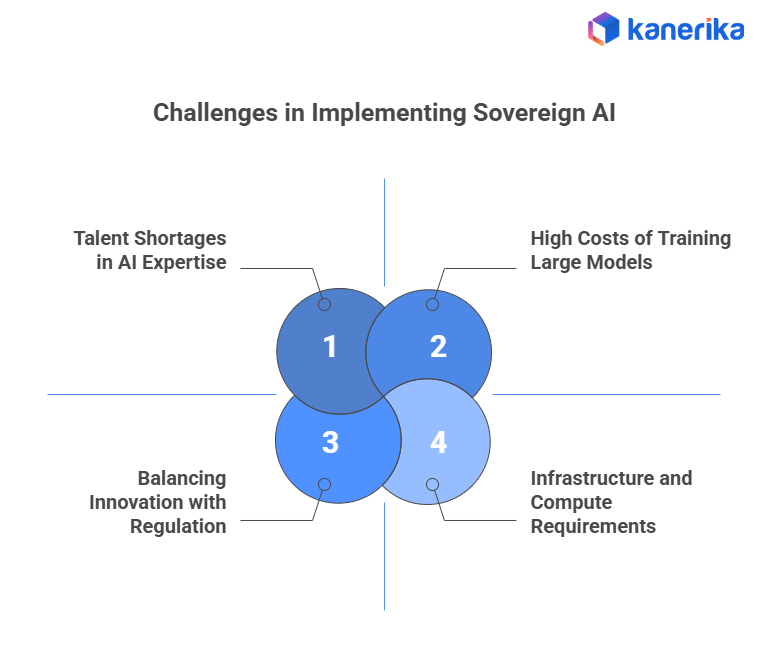When the European Union announced its push for sovereign AI, it sent a clear message. Control over data and AI infrastructure is now as critical as control over borders. In a world where AI models are mostly built and hosted by a few large tech companies, countries, and businesses are asking a direct question. Do we really own our intelligence if we do not own our AI?
According to Gartner, by 2028, around 65 % of governments worldwide will introduce sovereignty requirements for AI systems. The goal is to reduce dependence on foreign infrastructure and avoid regulatory interference. Enterprises are responding too.
Banks in Europe are deploying AI models on domestic infrastructure to meet GDPR rules and avoid vendor lock-in. Saudi Arabia’s HUMAIN initiative, backed by $ 100 billion, and India’s Sarvam AI project are examples of large-scale investments focused on building region-specific AI capabilities.
For businesses, sovereign AI is no longer just a government concern. It is becoming a strategic shift. Companies in finance, healthcare, and telecom are exploring private AI deployments to protect sensitive data, meet compliance standards, and reduce geopolitical risk. As regulations tighten and public trust becomes harder to earn, owning your AI stack is turning into a business necessity.
What is Sovereign AI?
Sovereign AI refers to artificial intelligence systems that a country or enterprise fully controls. This includes the data, infrastructure, models, and governance. It’s designed to operate independently of foreign platforms or providers. The goal is to ensure that sensitive data and decision-making processes remain under local control and oversight.
Sovereign AI is built and managed within a specific jurisdiction. The organization decides how data is collected, processed, and used. It doesn’t rely on external cloud services or global AI APIs. Everything from training to deployment is done in-house or through trusted local partners.
This approach is becoming increasingly common in sectors such as healthcare, finance, defense, and public services, where data sensitivity is high and compliance is stringent.
Why it Matters in the Age of Data Dependence
Data is now considered a strategic asset, much like oil or natural resources. Most enterprises today use AI tools built by global tech companies. These tools often run on shared infrastructure and use centralized models. That means:
- Data may be stored or processed outside your country
- You have limited control over how models behave
- External vendors make updates and changes
- You’re exposed to foreign laws and risks
Sovereign AI solves this by keeping everything local. It gives enterprises complete control over their data, models, and infrastructure.
How Soverign AI Differs from Traditional AI Models
| Aspect | Traditional AI Models | Sovereign AI Models |
| Data Control | Data is often stored and processed in foreign cloud environments | Data remains within national or enterprise boundaries |
| Transparency | Often functions as a “black box” with limited explainability | Built for explainability and auditability |
| Regulatory Compliance | May face challenges meeting local laws (GDPR, EU AI Act, etc.) | Designed to align with local regulations from the start |
| Customization | Standardized, globalized models with limited local adaptation | Tailored to local languages, cultures, and industry needs |
| Security | Higher risk of external access or breaches | Stronger security through localized infrastructure |
| Dependency | Heavy reliance on global tech providers | Reduced dependency, fostering independence |
Build AI That Respects Your Data and Compliance Needs!
Partner with Kanerika to achieve your Sovereign AI goals.
Why Nations and Enterprises Are Turning to Sovereign AI
Governments and enterprises are adopting sovereign AI to protect data, meet legal requirements, and reduce dependency on foreign tech. It’s not just about control—it’s about resilience, trust, and strategic autonomy.
1. Data Sovereignty and Privacy Protection
For both governments and enterprises, protecting citizen and customer data is a priority. Sovereign AI ensures this by:
- Maintaining strict control over sensitive datasets such as health, financial, and defense records.
- Minimizing exposure to global data misuse risks by keeping information within secure environments.
- Building public trust by demonstrating transparency in AI adoption.
2. Reducing Reliance on Foreign AI Providers
A few global giants have largely dominated the field of AI innovation. This dependence creates risks around cost, accessibility, and data control. Sovereign AI reduces such risks by:
- Developing independent AI ecosystems that align with national strategies.
- Protecting organizations from vendor lock-in and restrictive licensing.
- Allowing flexible, scalable growth without reliance on external providers.
3. Compliance with Local Regulations (EU AI Act, GDPR, etc.)
New AI regulations worldwide are transforming how organizations manage data and make AI-driven decisions. Sovereign AI makes compliance easier because:
- Systems are designed locally to meet regulatory standards from the start.
- AI models can be adapted quickly as laws evolve.
- Audits and oversight are simplified since data remains within the jurisdiction.
4. National Security and Strategic Independence
AI is increasingly tied to national security. Countries that lack control over AI risk external interference in critical systems. Sovereign AI strengthens security by:
- Safeguarding defense and intelligence data from foreign control.
- Building resilient infrastructure to withstand cyber threats.
- Ensuring strategic independence in global technology competition.
Beyond Basic Security: How AI Surveillance Benefits Key Industries
Learn how AI surveillance enhances security, monitoring, and operational efficiency.
Key Benefits of Sovereign AI
Sovereign AI isn’t just about control—it brings practical advantages for enterprises and governments. It helps improve compliance, build trust, and create AI systems that are more relevant to local needs. These benefits are especially valuable in industries where data sensitivity, regulation, and customer expectations are high.
1. Trustworthy AI and Explainability
Sovereign AI allows full visibility into how models are trained and how decisions are made. Enterprises can audit the data, understand the logic behind predictions, and ensure that models behave as expected. This level of transparency is hard to achieve with third-party AI tools. It helps meet ethical standards and builds trust with regulators, customers, and internal stakeholders.
2. Tailored Models for Local Languages and Cultures
Generic AI models often miss local context. They may not be familiar with regional languages, cultural nuances, or domain-specific terminology. Sovereign AI solves this by allowing organizations to train models on local datasets. This improves accuracy, relevance, and user experience. For example, a healthcare chatbot trained on regional medical records and local languages will perform better than a global model.
3. Economic Growth and Innovation Opportunities
Investing in sovereign AI supports local tech ecosystems. It creates jobs in AI development, infrastructure, and compliance. It encourages partnerships between enterprises, universities, and startups. Moreover, it also helps build national intellectual property, rather than relying on imported technologies. Over time, this strengthens the economy and positions the country or enterprise as a leader in responsible AI.
4. Competitive Advantage for Businesses
Sovereign AI gives companies more control over their data, models, and infrastructure. This leads to faster decision-making, better compliance, and stronger differentiation. Businesses can build AI systems that reflect their strategy, values, and customer needs—not someone else’s roadmap. In competitive markets, this kind of control can be a major advantage.
Key advantages include:
- Complete control over sensitive data
- Easier compliance with local laws
- Customization for specific business goals
- Reduced dependency on external vendors
- Stronger alignment with customer expectations

Challenges in Implementing Sovereign AI
Sovereign AI offers control and compliance, but building it comes with real challenges. Enterprises and governments must rethink their infrastructure, budgets, talent, and governance models to make them effective.
1. Infrastructure and Compute Requirements
Sovereign AI demands dedicated infrastructure. Unlike public cloud models, it can’t rely on shared global platforms. Organizations require secure data centers, high-performance computing clusters, and scalable storage solutions. This setup must support large-scale training and deployment while meeting strict data protection standards. For many enterprises, especially those outside tech-first sectors, this presents a significant challenge.
2. High Costs of Training Large Models
Training large AI models is expensive. It requires massive datasets, powerful GPUs or TPUs, and energy-efficient systems to manage heat and performance. Without access to shared cloud resources, costs rise quickly. Enterprises must invest in hardware, software, and ongoing maintenance to ensure optimal performance. For smaller organizations, this can make sovereign AI feel out of reach unless they partner with local providers or adopt modular approaches.
3. Talent Shortages in AI Expertise
Sovereign AI isn’t just about infrastructure—it needs skilled people. Data scientists, ML engineers, infrastructure architects, and compliance experts are all essential to the process. But AI talent is scarce, especially in regions outside major tech hubs. Enterprises often struggle to hire or retain the right mix of skills. Upskilling internal teams or collaborating with academic institutions can be beneficial, but it requires time and careful planning.
4. Balancing Innovation with Regulation
Sovereign AI must follow local laws, but strict regulation can slow innovation. Enterprises need to build models that are compliant from day one, without losing flexibility. This means working closely with legal teams, regulators, and industry bodies to define clear standards. It also means building systems that can adapt as laws evolve. The challenge is staying agile while staying compliant—a balance that’s hard to maintain in fast-moving industries.

Global Landscape of Sovereign AI Initiatives
Sovereign AI is no longer a niche concept. Countries worldwide are investing in it to protect data, boost innovation, and reduce reliance on foreign technology. Each region is taking a different approach based on its priorities and resources.
1. Europe’s Push for AI Independence
Europe is leading the way with strong regulatory frameworks and public investment. The EU AI Act establishes clear rules for the development and deployment of AI, with a focus on transparency, fairness, and accountability. Countries like France and Germany are building national AI models and infrastructure to reduce dependence on US-based platforms. Sovereign cloud initiatives and local LLMs are part of this broader strategy to align AI with European values.
2. U.S. vs. China: Competing Strategies in AI Sovereignty
The U.S. relies heavily on private sector innovation. Companies like OpenAI, Anthropic, and Google dominate the AI space, supported by venture capital and open-source communities. The government plays a strategic role through export controls and funding, but the ecosystem is largely decentralized.
China takes a more centralized approach. The government funds national AI labs, enforces strict data localization laws, and invests in domestic chip manufacturing. Sovereign AI in China is tied closely to national security and long-term self-reliance. Both countries view AI sovereignty as a strategic asset, but their approaches reflect distinct political and economic models.
3. India, the Middle East, and Emerging Economies’ Efforts
India is building sovereign AI through public-private partnerships. Initiatives like BharatGPT aim to create multilingual models that reflect India’s linguistic diversity. The government is also working on data protection laws and national AI infrastructure.
In the Middle East, countries like the UAE and Saudi Arabia are investing in sovereign cloud platforms and AI research centers. These efforts are part of broader digital transformation plans. To support these initiatives, reliable web developers for UAE businesses play a crucial role in creating secure and scalable digital solutions.
Emerging economies in Africa and Southeast Asia are exploring sovereign AI to support local innovation, improve public services, and reduce tech dependency.
Sovereign AI for Businesses
Sovereign AI isn’t just a government concern. Enterprises have a lot to gain—especially those handling sensitive data or operating in regulated markets.
Why Enterprises Should Care Beyond Government Initiatives
Government-led sovereign AI initiatives set the tone, but businesses must act independently. Enterprises face significant risks when using third-party AI tools, including data exposure, compliance gaps, and vendor lock-in. Sovereign AI helps mitigate these risks. It gives companies full control over their data, models, and infrastructure. It also allows them to build AI systems that reflect their values, goals, and customer expectations.
Use Cases in Finance, Healthcare, and Manufacturing
In finance, sovereign AI supports secure fraud detection, risk modeling, and customer onboarding. These systems handle sensitive financial data and must comply with strict regulations.
In healthcare, it enables privacy-preserving diagnostics, treatment planning, and patient engagement. Sovereign AI ensures that medical data stays within national borders and meets ethical standards.
In manufacturing, it powers predictive maintenance, quality control, and supply chain optimization. These models often rely on proprietary sensor data and internal workflows, making sovereignty a key advantage.
Building Trust with Customers Through AI Sovereignty
Customers are more aware of how their data is used. They want transparency, control, and accountability. Sovereign AI helps businesses meet these expectations. By keeping data local and building explainable models, companies can show they take privacy seriously. This builds trust, improves brand reputation, and strengthens customer loyalty—especially in industries where trust is a competitive edge.
How AI Is Improving Cybersecurity Strategies
Discover how AI enhances cybersecurity through real-time threat detection, automated responses & adaptive defense mechanisms.
How Kanerika Supports Your Enterprise’s Sovereign AI Goals
Kanerika helps enterprises take control of their AI systems by building secure, compliant, and scalable solutions. With deep experience in data governance and AI integration, Kanerika supports organizations that want to move beyond generic tools and build models tailored to their specific business needs. This includes establishing robust governance frameworks, managing sensitive data, and ensuring full compliance with regulations such as GDPR, HIPAA, and the EU AI Act.
For companies exploring sovereign AI, Kanerika offers support across the full lifecycle—from data preparation to model deployment. Instead of relying on public APIs or shared cloud platforms, Kanerika helps businesses train custom models using their own data. These models reflect local languages, domain-specific needs, and internal workflows. Kanerika also ensures that AI systems are explainable, auditable, and aligned with enterprise goals.
Kanerika’s infrastructure expertise enables enterprises to deploy AI securely. Whether it’s on-premises, in a sovereign cloud, or within hybrid environments, Kanerika helps integrate AI into existing systems without compromising performance or control. For businesses that want to build trust, stay compliant, and reduce dependency on external vendors, Kanerika makes sovereign AI practical and scalable.
Turn Compliance into Competitive Advantage with Sovereign AI!
Partner with Kanerika to design AI solutions built for your region.
FAQs
1. What is Sovereign AI in simple terms?
Sovereign AI refers to artificial intelligence systems that are developed, deployed, and controlled within a nation or enterprise to ensure data privacy, compliance, and independence from foreign providers.
2. Why is Sovereign AI important for governments and businesses?
It protects sensitive data, prevents overreliance on global tech providers, and ensures compliance with regional laws. For governments, it strengthens national security and citizen trust. For businesses, it safeguards customer data, supports transparency, and enables localized innovation aligned with cultural and regulatory needs.
3. How is Sovereign AI different from traditional AI models?
Traditional AI is often hosted on foreign platforms, raising privacy and compliance concerns. Sovereign AI keeps infrastructure and data under local control, offering greater transparency, explainability, and adaptability to local languages, industries, and regulations. This makes it more trustworthy and better suited for regional requirements.
4. Which countries are investing in Sovereign AI?
The EU, U.S., China, India, UAE, and several emerging economies are leading sovereign AI initiatives to achieve digital independence and security.
5. Which industries can benefit most from Sovereign AI?
Industries dealing with sensitive or regulated data see the biggest impact on finance, healthcare, defense, and government services. Sovereign AI helps them ensure privacy, comply with regulations, and adapt AI solutions to local needs. It also supports sectors like telecom and education by fostering secure innovation.
6. Can enterprises adopt Sovereign AI or is it only for governments?
Yes, enterprises can adopt sovereign AI to secure customer data, comply with regulations, and gain competitive advantage in industries like finance, healthcare, and manufacturing.









